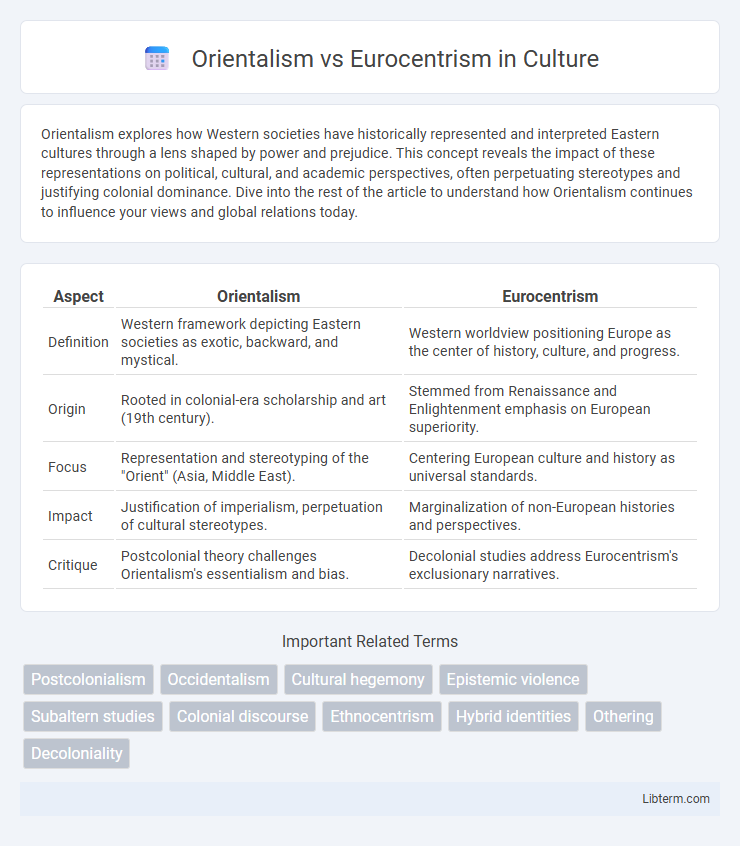Orientalism explores how Western societies have historically represented and interpreted Eastern cultures through a lens shaped by power and prejudice. This concept reveals the impact of these representations on political, cultural, and academic perspectives, often perpetuating stereotypes and justifying colonial dominance. Dive into the rest of the article to understand how Orientalism continues to influence your views and global relations today.
Table of Comparison
| Aspect | Orientalism | Eurocentrism |
|---|---|---|
| Definition | Western framework depicting Eastern societies as exotic, backward, and mystical. | Western worldview positioning Europe as the center of history, culture, and progress. |
| Origin | Rooted in colonial-era scholarship and art (19th century). | Stemmed from Renaissance and Enlightenment emphasis on European superiority. |
| Focus | Representation and stereotyping of the "Orient" (Asia, Middle East). | Centering European culture and history as universal standards. |
| Impact | Justification of imperialism, perpetuation of cultural stereotypes. | Marginalization of non-European histories and perspectives. |
| Critique | Postcolonial theory challenges Orientalism's essentialism and bias. | Decolonial studies address Eurocentrism's exclusionary narratives. |
Understanding Orientalism: Origins and Definitions
Orientalism, a concept popularized by Edward Said, refers to the Western depiction and interpretation of Eastern cultures, often characterized by stereotypes and exoticism that serve colonial interests. It originates from historical European scholarship and imperialistic attitudes that framed the East as fundamentally different and inferior to the West. Understanding Orientalism requires analyzing its role in shaping cultural narratives and power dynamics that continue to influence global perspectives.
What is Eurocentrism? Core Concepts and History
Eurocentrism is an ideological framework that centers European history, culture, and values as universal standards, often marginalizing non-European perspectives. Rooted in the Enlightenment and colonial expansion, it frames Europe as the pinnacle of civilization and progress, influencing academic disciplines, historiography, and global power dynamics. This concept critiques the assumption of European superiority and challenges narratives that ignore the complexities and contributions of other cultures beyond Europe.
Comparative Analysis: Orientalism vs Eurocentrism
Orientalism and Eurocentrism both serve as frameworks that shape cultural and historical interpretations through a Western lens, but Orientalism specifically exoticizes and marginalizes Eastern societies, portraying them as static and irrational whereas Eurocentrism centers European values and history as universal and superior. Orientalism tends to create a binary opposition between the West and the "Orient," emphasizing cultural otherness, while Eurocentrism emphasizes European dominance in intellectual, political, and economic realms across global narratives. Comparative analysis reveals that Orientalism is a subset of Eurocentrism with a geographic focus on Asia and the Middle East, both perpetuating Western hegemony but differing in scope and specific representational strategies.
Power Dynamics in Knowledge Production
Orientalism and Eurocentrism both reflect power dynamics in knowledge production by privileging Western perspectives and marginalizing non-Western voices. Edward Said's concept of Orientalism exposes how Western scholarship constructs and stereotypes the East to justify colonial domination and cultural superiority. Eurocentrism reinforces this by positioning European experiences as universal, shaping academic discourses and global narratives that consolidate geopolitical power and intellectual authority.
Representation of “The Other” in Literature and Media
Orientalism constructs the East as exotic, irrational, and inferior through stereotypes embedded in literature and media, shaping Western perceptions by emphasizing cultural difference and reinforcing power imbalances. Eurocentrism centers European values and experiences as universal norms, marginalizing non-Western voices and depicting "The Other" through a lens of cultural superiority and heterodoxy. These representational frameworks influence narrative authority, perpetuate colonial ideologies, and affect identity formation in global cultural discourse.
Colonial Legacies: Impact on Modern Societies
Colonial legacies of Orientalism and Eurocentrism have deeply shaped modern societies by embedding power dynamics that privilege Western knowledge and cultural norms while marginalizing non-Western identities. These frameworks influenced economic structures, legal systems, and educational curricula, perpetuating inequalities and cultural stereotypes that persist today. Understanding these impacts is crucial for addressing systemic biases and promoting more inclusive global perspectives.
Stereotypes and Cultural Misinterpretations
Orientalism often perpetuates stereotypes by depicting Eastern societies as exotic, backward, and irrational, reinforcing a sense of Western superiority and otherness. Eurocentrism centers European cultural norms and histories as universal, leading to cultural misinterpretations that marginalize non-European perspectives and knowledge systems. Both frameworks contribute to oversimplified narratives that hinder genuine cross-cultural understanding and promote asymmetric power dynamics in global discourse.
Decolonizing Scholarship: Towards Balanced Worldviews
Decolonizing scholarship prioritizes dismantling Orientalism and Eurocentrism by challenging dominant Western narratives that marginalize non-Western perspectives. This approach emphasizes the inclusion of diverse epistemologies and cultural contexts to foster balanced worldviews and equitable knowledge production. Integrating indigenous methodologies and cross-cultural dialogue enriches academic discourse and promotes global intellectual pluralism.
Contemporary Relevance in Global Discourse
Orientalism and Eurocentrism continue to shape global discourse by influencing cultural representation, power dynamics, and identity politics in contemporary society. Critical debates on postcolonial theory, media portrayals, and international relations often highlight how Eurocentric perspectives marginalize non-Western narratives while Orientalism perpetuates stereotypes about Eastern cultures. Addressing these biases is essential for fostering inclusive dialogue, equitable policy-making, and cross-cultural understanding in today's interconnected world.
Moving Beyond Dichotomies: Cross-Cultural Engagement
Moving beyond dichotomies between Orientalism and Eurocentrism involves fostering genuine cross-cultural engagement that transcends simplistic binaries. This approach emphasizes mutual understanding, respect for cultural diversity, and the deconstruction of ingrained stereotypes perpetuated by Orientalist and Eurocentric frameworks. Engaging with diverse perspectives enables a more nuanced dialogue that challenges hegemonic narratives and promotes inclusivity in global discourse.
Orientalism Infographic

 libterm.com
libterm.com